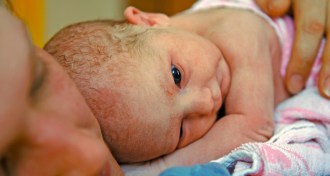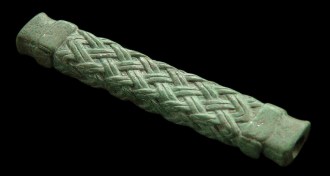Humans
Sign up for our newsletter
We summarize the week's scientific breakthroughs every Thursday.
-
 Health & Medicine
Health & MedicineA timeline of a baby’s first hour
A study carefully documents newborns’ instinctual behaviors in the first hour outside the womb, observations that paint a picture of what babies might need in the moments after birth.
-
 Microbes
MicrobesGut bacteria protein linked to anorexia and bulimia
Gut bacteria may play a role in eating disorders, a new study suggests.
-
 Health & Medicine
Health & MedicineFirst Ebola patient diagnosed in U.S. dies
Thomas Eric Duncan, who contracted the virus in Liberia and fell ill four days after traveling to Dallas, died October 8.
-
 Archaeology
ArchaeologyIndonesian stencils rival age of Europe’s early cave art
Hand prints outlined in pigment were made in Southeast Asia at least 39,900 years ago, making the paintings about the same age as European cave art.
By Bruce Bower -
 Anthropology
AnthropologyMysterious foreigner may have ruled ancient Maya kingdom
Bone chemistry suggests one of the early rulers of the Maya kingdom Copan and his retainers had foreign credentials.
By Bruce Bower -
 Health & Medicine
Health & MedicineInteractive map tracks obesity in the United States
An interactive online map illustrates the rise in U.S. obesity since 1990.
By Nathan Seppa -
 Health & Medicine
Health & MedicineZero calories and other awe-inspiring science tales
In this issue, reporters look at artificial sweeteners, resurrecting a West Coast plant, quasiparticles and the future of our magazine and its parent non-profit, SSP.
By Eva Emerson -

-
 Health & Medicine
Health & MedicinePregnant women’s immune systems overreact to the flu
A new study offers an exception to the assumption that a pregnant woman’s immune system fades to keep from attacking the growing fetus.
-
 Health & Medicine
Health & MedicineStill waiting on a cure for diabetes
Diabetes diagnoses have skyrocketed in the past 50 years. While there are now better medications and options for control, there is still only hope of a cure.
-
 Neuroscience
NeuroscienceHigh blood sugar could worsen effects of spinal injury
Studies in people and mice suggest reining in blood sugar can improve recovery from a spinal cord injury.
By Nathan Seppa -
 Health & Medicine
Health & MedicineThe sour side of artificial sweeteners
A new study found that saccharin alters the gut microbiome of mice and produces insulin resistance, but it’s not the first to show the sour side of diet drinks.